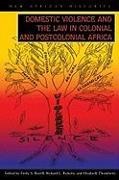Read more
Informationen zum Autor Emily S. Burrill is an associate professor in the Department of Women's and Gender Studies at the University of North Carolina at Chapel Hill! where she teaches courses on African history! gender studies! and feminist theory. Her articles have appeared in "Slavery and Abolition!" "Cahiers d'Etudes Africaines!" and "Ultramarines: Revue de l'association des amis des archives d'outre-mer." Klappentext "Domestic Violence and the Law in Colonial and Postcolonial Africa" reveals the ways in which domestic space and domestic relationships take on different meanings in African contexts that extend the boundaries of family obligation! kinship! and dependency. The term domestic violence encompasses kin-based violence! marriage-based violence! gender-based violence! as well as violence between patrons and clients who shared the same domestic space. This collection brings into conversation historical! anthropological! legal! and activist perspectives on domestic violence in Africa and fosters a deeper understanding of the problem of domestic violence! the limits of international human rights conventions! and local and regional efforts to address the issue. "This is a fascinating and extensively researched exploration of a range of forms of gender-based violence that combines historical, anthropological, and legal perspectives. One of its strengths is the way it juxtaposes studies of the legal regulation of violence in the colonial era with that of the postcolonial human rights era." - Sally Engle Merry, author of Human Rights and Gender Violence: Translating International Law into Local Justice "... (T)his collection is an important opening call for future research into the topic of domestic violence and African family/household histories... This book will not only be widely appealing to scholars, but could also serve as a useful supplementary text in a number of undergraduate courses." - International Journal of African Historical Studies "For several decades, scholars have effectively mined trial transcripts and other legal sources for innovative perspectives in social history. Despite subjective testimony and other limitations, such documents contain direct evidence from otherwise voiceless, obscure people. This book continues that trend, revealing the experiences of targets and perpetrators of intimate, private violence... Summing Up: Recommended." - CHOICE Zusammenfassung Domestic Violence and the Law in Colonial and Postcolonial Africa reveals the ways in which domestic space and domestic relationships take on different meanings in African contexts that extend the boundaries of family obligation, kinship, and dependency....

